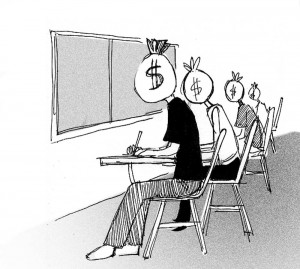GE’s need to be restructured
The economy is obviously struggling. People are wary of spending money freely, and watching their expenses carefully.
As a result, the increasingly expensive financial and personal investment that is education has emerged as a stress.
At a time when families are pressed for money and wondering if their children will be able to secure jobs after graduation to repay loans, making such an expensive investment with fewer and fewer economic guarantees seems questionable.
But at the end of the day, a suffering economy demands more investment in education. Disinvestment is not the answer; rather, a rethinking of how schools spend their money is in order so they can better serve the students.
USC students are familiar with the challenges of paying top dollar for an education. It’s likely that by the end of a student’s educational career here, he or she might be knee-deep in debt.
There is undeniable evidence, however, that any investment in higher education is a good one.
A high school graduate earns about 40 percent more than a high school dropout, and a college graduate earns about 50 percent more than an individual with only a high school diploma.
Even if you have to take out loans now, it’s a worthwhile investment for your long-term financial, professional and personal future.
Judith Scott-Clayton, assistant professor of economics and education at Teachers College at Columbia University, wrote in a recent debate on The New York Times website on the topic of the value of educational investment: “Any cure for this anemic economy is going to involve a more educated and better-educated population, not less,” she said. “This doesn’t mean that educational programs should be exempt from questions about effectiveness and efficiency.”
If students don’t feel they’re getting what they’re paying for, universities need to change.
Students’ interests should be represented in terms of class selection and requirements.
The concept of core requirements can be incredibly restrictive and can take away time and money from students’ true interests.
Transfer students in particular receive the short end of the stick when it comes to USC’s general education requirements — they are forced to repeat unnecessary, lower level general education classes that take precious time away from their major classes.
Why not change the general education system to be more flexible and tailored to students’ interests? The result would be more satisfied, engaged students who would develop better work habits in the areas of study they actually care about.
Becoming a well-rounded student is important. The goal of these programs is not to bore us with classes that seem tedious but to deepen our interest in fields we might not have been interested in before.
But there must be changes to the general education system to maximize the value of school. Lessening the amount of requirements is a positive first step.
There is also value in spending smarter, not less — for example, increasing teacher pay to draw the best of the best to USC, or using funds to reduce class size.
Education is too key of an asset to ignore or discard because of financial concerns. The fact of the matter is that education is a requirement in most of the workforce. Students and administrators must work together to ensure that the university is run in the most cost-efficient way possible.
It’s idealistic to think schools can run in perfect parallel to our interests and needs, but seeing as we are making such a large investment and should continue to do so, we deserve more say in what we’re paying for.
Elena Kadvany is a senior majoring in Spanish. Her column “Beyond the Classroom “ runs Mondays.


Comments are closed.